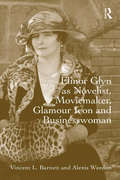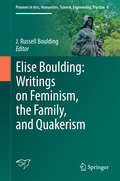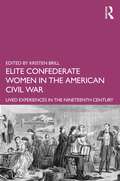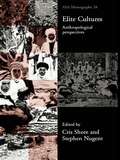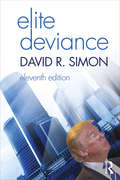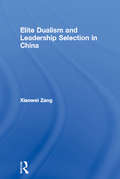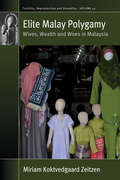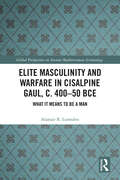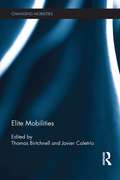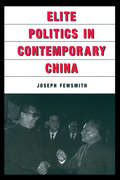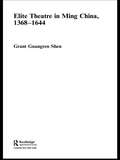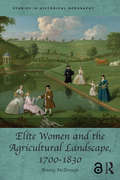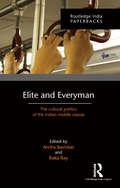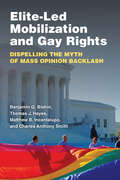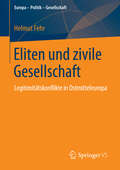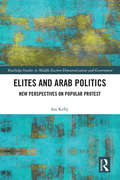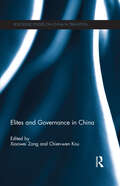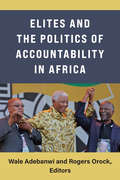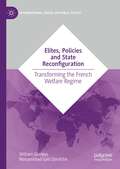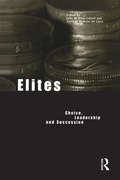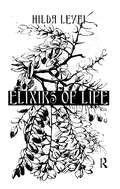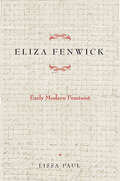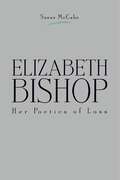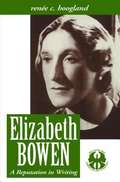- Table View
- List View
Elinor Glyn as Novelist, Moviemaker, Glamour Icon and Businesswoman
by Vincent L. Barnett Alexis WeedonThe first full-length study of the authorial and cross-media practices of the English novelist Elinor Glyn (1864-1943), Elinor Glyn as Novelist, Moviemaker, Glamour Icon and Businesswoman examines Glyn’s work as a novelist in the United Kingdom followed by her success in Hollywood where she adapted her popular romantic novels into films. Making extensive use of newly available archival materials, Vincent L. Barnett and Alexis Weedon explore Glyn’s experiences from multiple perspectives, including the artistic, legal and financial aspects of the adaptation process. At the same time, they document Glyn’s personal and professional relationships with a number of prominent individuals in the Hollywood studio system, including Louis B. Mayer and Irving Thalberg. The authors contextualize Glyn’s involvement in scenario-writing in relationship to other novelists in Hollywood, such as Edgar Wallace and Arnold Bennett, and also show how Glyn worked across Europe and America to transform her stories into other forms of media such as plays and movies. Providing a new perspective from which to understand the historical development of both British and American media industries in the first half of the twentieth century, this book will appeal to historians working in the fields of cultural and film studies, publishing and business history.
Elise Boulding: Writings on Feminism, the Family and Quakerism
by J. Russell BouldingThis volume honors the lifetime achievements of the distinguished activist and scholar Elise Boulding (1920-2010) on the occasion of her 95th birthday. Known as the "matriarch" of the twentieth century peace research movement, she made significant contributions in the fields of peace education, future studies, feminism, and sociology of the family, and as a prominent leader in the peace movement and the Society of Friends. She taught at the University of Colorado, Boulder from 1967 to 1978 and at Dartmouth College from 1978 to 1985, and was instrumental in the development of peace studies programs at both institutions. She was a co-founder of the International Peace Research Association (1964), the Consortium on Peace Research Education and Development (1970), and various peace and women's issues-related committees and working groups of the American Sociological Association and International Sociological Association.
Elite Confederate Women in the American Civil War: Lived Experiences in the Nineteenth Century
by Kristen BrillElite Confederate Women in the American Civil War is a wide-ranging primary source collection that offers a compelling selection of upper-class, white Confederate women’s voices from archives across the South. From the prison diary of Mary Terry to Elizabeth Baker Crozier’s eyewitness account of the siege of Knoxville, this volume introduces lesser-known voices of the war to show the interconnections between the home front and the front lines, and how the war shaped the lives of women and households across the South. This collection challenges students to engage with the role of first-person narratives in history and to reconsider the roles of southern women in the Civil War. Exploring the themes of slavery, nationalism, secession and occupation, these narratives offer new ways to think about traditional issues in Civil War history and, more broadly, show the ways in which studies of women and gender can enrich studies of cultures of war. This book is designed for undergraduate and graduate students of both the American Civil War and women’s history.
Elite Cultures: Anthropological Perspectives (ASA Monographs #Vol. 38)
by Cris Shore Stephen NugentDrawing on a diverse, comparative ethnographic literature, this new volume examines the intimate spaces and cultural practices of those elites who occupy positions of power and authority across a variety of different settings.Using ethnographic case studies from a wide range of geographical areas, including Mexico, Peru, Amazonia, Indonesia, Sri Lanka, Europe, North America and Africa, the contributors explore the inner worlds of meaning and practice that define and sustain elite identities. They also provide insights into the cultural mechanisms that maintain elite status, and into the complex ways that elite groups relate to, and are embedded within, wider social and historical processes.
Elite Deviance (Mysearchlab Series 15% Off Ser.)
by David R. SimonTracing the causes of elite deviance to the structure of U.S. power and wealth, this book introduces students to theories of elite deviance and covers both criminal and non-criminal elite acts that cause significant harm. This considerably updated, 11th edition enriches its coverage of both historical and contemporary elite deviance. Updates include: New and expanded discussions on history, property, and historical critique from Revolutionary America onward. New analysis on Donald Trump: his cabinet members of the political elite, his relationship with the EPA, and his business connections. Investigation into Caribbean and European tax havens. An extended review on elite deviance and increasing inequalities. Very current information and examples of scandals in international conflicts. The section on changing media patterns.
Elite Dualism and Leadership Selection in China (Routledge Studies on China in Transition)
by Xiaowei ZangWho are the top political leaders in China? What are the major criteria in elite recruitment? How is job promotion in high politics determined? By studying over one and a half thousand top political Chinese leaders, this book seeks to answer these questions and, as a result, defines how Chinese leadership is stratified. Unlike existing research on Chinese leaders, Elite Dualism and Leadership Selection in China draws on extensive statistical information and data analysis. It evidences how political development in the reform era has led to the division of labour between the Chinese Communist Party (CCP) and the government in governance, leading to two distinctive career paths in the two political systems respectively. Key issues examined include: * the different criteria the CCP and the government demand * the requirements for promotion * the effect of university education on the rate of mobility * the different affiliations of the two groups * the role of cooptation in leadership selection. Many of the elites discussed are still leading figures in China, making this book the most up-to-date and extensive biographical data set in elite studies. This allows for a meaningful analysis of elite behaviour in China for the first time in Chinese Studies. This book will be useful to both students of Chinese studies and comparative politics and will also interest researchers, political commentators, statesmen and China-watchers.
Elite Malay Polygamy: Wives, Wealth and Woes in Malaysia (Fertility, Reproduction and Sexuality: Social and Cultural Perspectives #41)
by Miriam Koktvedgaard ZeitzenElite Malay women’s polygamy narratives are multiple and varied, and their sentiments regarding the practice are conflicted, as they are often torn between personal and religious convictions. This volume explores the ways in which this increasingly prominent practice impacts Malay gender relations. As Muslims, elite Malay women may be forced to accept polygamy, but they mostly condemn it as women and wives, as it forces them to manage their lives and loves under the “threat” of polygamy from a husband able to marry another woman without their knowledge or consent; a husband that is married but available.
Elite Masculinity and Warfare in Cisalpine Gaul, c. 400-50 BCE: What it Means to be a Man (Global Perspectives on Ancient Mediterranean Archaeology)
by Alastair R. LumsdenThis volume explores the relationship between how elite masculinity was expressed and warfare in Cisalpine Gaul between c. 400 and 50 BC.The first half of the book demonstrates that material changes in funerary assemblages reflected broader socio-political and military developments. The second half of this study presents the first in-depth analysis of the organisational and tactical capabilities of infantry and cavalry forces in Cisalpine Gaul. Ultimately, this book demonstrates that the Cisalpine Gallic tribes experienced significant socio-political developments during the third century, which significantly increased the sophistication of their warcraft and military forces.Owing to its broad scope and interdisciplinary approach, this book will appeal to professional scholars, university students, and history enthusiasts alike who are interested in archaeology, expressions of elite identity, military studies, and the socio-political development of the lesser-known cultural groups of pre-Roman Italy, the western Mediterranean, and the wider Celtic world in the last four centuries BCE.
Elite Mobilities (Changing Mobilities)
by Thomas Birtchnell Javier CaletríoSmall in number but great in influence, mobile elites have shaped the contours of global capitalism. Today these elites continue to flourish globally but in a changing landscape. The current economic crisis—and rising concerns about the moral legitimacy of extreme wealth—coincides with stern warnings over the risks posed by climate change and the unsustainable use of resources. Often an out-of-bounds topic in critical social science, elites are thought of as too inaccessible a group to interview and too variable a minority to measure. This groundbreaking collection sets out to challenge this perception. Through the careful examination of the movements of the one per cent through the everyday spaces of the ninety-nine per cent, Elite Mobilities investigates the shared zones elites inhabit alongside the commons: the executive lounge in the airport, the penthouse in the hotel, or the gated community next to the slum. Bringing together the pioneer scholars in critical sociology today, this collection explores how social scientists can research, map, and ‘track’ the flows and residues of objects, wealth and power surrounding the hypermobile. Elite Mobilities sets a new benchmark in social science efforts to research the powerful and the privileged. It will appeal to students and scholars interested in mobilities, transport, tourism, social stratification, class, inequality, consumption, and global environmental change.
Elite Parties, Poor Voters
by Tariq ThachilWhy do poor people often vote against their material interests? This puzzle has been famously studied within wealthy Western democracies, yet the fact that the poor voter paradox also routinely manifests within poor countries has remained unexplored. This book studies how this paradox emerged in India, the world's largest democracy. Tariq Thachil shows how arguments from studies of wealthy democracies (such as moral values voting) and the global south (such as patronage or ethnic appeals) cannot explain why poor voters in poor countries support parties that represent elite policy interests. He instead draws on extensive survey data and fieldwork to document a novel strategy through which elite parties can recruit the poor, while retaining the rich. He shows how these parties can win over disadvantaged voters by privately providing them with basic social services via grassroots affiliates. Such outsourcing permits the party itself to continue to represent the policy interests of their privileged base.
Elite Politics in Contemporary China
by Joseph FewsmithA discussion of elite politics in contemporary China. While a great deal of the text is descriptive, much of the emphasis is on drawing out and abstracting the political dynamic at work.
Elite Theatre in Ming China, 1368-1644 (Routledge Studies in the Early History of Asia)
by Grant Guangren ShenTheatre occupied a particularly important place in the life of the elite, for whom owning a theatre troupe was highly fashionable and for whom theatre performances were an integral part of formal gatherings, various rituals and ceremonies. Based on an exploration of original historical records, including comparisons with other forms of ancient theatre, Shen provides an overview of elite theatre in Ming China and examines the details of theatrical performance.
Elite Women and the Agricultural Landscape, 1700–1830 (Studies in Historical Geography)
by Briony McDonaghElite Women and the Agricultural Landscape, 1700–1830 offers a detailed study of elite women’s relationships with landed property, specifically as they were mediated through the lens of their estate management and improvement. This highly original book provides an explicitly feminist historical geography of the eighteenth-century English rural landscape. It addresses important questions about propertied women’s role in English rural communities and in Georgian society more generally, whilst contributing to wider cultural debates about women’s place in the environmental, social and economic history of Britain. It will be of interest to those working in Historical and Cultural Geography, Social, Economic and Cultural History, Women’s Studies, Gender Studies and Landscape Studies. Chapters 2, 3, and 4 of this book are freely available as downloadable Open Access PDFs at http://www.taylorfrancis.com under a Creative Commons Attribution-Non Commercial-No Derivatives (CC-BY-NC-ND) 4.0 license.
Elite and Everyman: The Cultural Politics of the Indian Middle Classes
by Editors Amita BaviskarThis book examines the middle classes — who they are and what they do — and their influence in shaping contemporary cultural politics in India. Describing the historical emergence of these classes, from the colonial period to contemporary times, it shows how the middle classes have changed, with older groups shifting out and new entrants taking place, thereby transforming the character and meanings of the category. The essays in this volume observe multiple sites of social action (workplaces and homes, schools and streets, cinema and sex surveys, temples and tourist hotels) to delineate the lives of the middle classes and show how middle-class definitions and desires articulate hegemonic notions of the normal and the normative.
Elite-Led Mobilization and Gay Rights: Dispelling the Myth of Mass Opinion Backlash
by Benjamin Bishin Matthew Incantalupo Thomas Hayes Charles A SmithMedia and scholastic accounts describe a strong public opinion backlash—a sharply negative and enduring opinion change—against attempts to advance gay rights. Academic research, however, increasingly questions backlash as an explanation for opposition to LGBT rights. Elite-Led Mobilization and Gay Rights argues that what appears to be public opinion backlash against gay rights is more consistent with elite-led mobilization—a strategy used by anti-gay elites, primarily white evangelicals, seeking to prevent the full incorporation of LGBT Americans in the polity in order to achieve political objectives and increase political power. This book defines and tests the theory of Mass Opinion Backlash and develops and tests the theory of Elite-Led Mobilization by employing a series of online and natural experiments, surrounding the U.S. Supreme Court rulings in Obergefell v. Hodges and United States v. Windsor, and President Obama’s position change on gay marriage. To evaluate these theories, the authors employ extensive survey, voting behavior, and campaign finance data, and examine the history of the LGBT movement and its opposition by religious conservatives, from the Lavender Scare to the campaign against Trans Rights in the defeat of Houston’s 2015 HERO ordinance. Their evidence shows that opposition to LGBT rights is a top-down process incited by anti-gay elites rather than a bottom-up reaction described by public opinion backlash.
Eliten und zivile Gesellschaft
by Helmut FehrIn dieser Studie werden Eliten in Ostmitteleuropa unter vergleichenden Gesichtspunkten untersucht. Das Spektrum der Eliten reicht von den kommunistischen Führungsgruppen bis zu neuen Machteliten und Gegeneliten, der Untersuchungszeitraum von 1968 bis 2013. Auf breiter empirischer Basis (ausführliche Interviews, Dokumente, Printmedien) beleuchtet der Autor den Elitenwandel in Polen, der Tschechischen Republik und der DDR/Ostdeutschland. Dabei geht es um ein tieferes Verständnis der Demokratisierung, der Elitenbildung und der Legitimitätskonflikte vor und nach den revolutionären Umbrüchen von 1989.
Elites and Arab Politics: New Perspectives on Popular Protest (Routledge Studies in Middle Eastern Democratization and Government)
by Ian KellyThis work explains elite behaviour in authoritarian systems and proposes why elites withdraw their support for the incumbent when faced with popular uprisings. Building upon foundations drawn from institutional authoritarianism and synthesised with local context from the substantial scholarship on the Middle East and North Africa, the book argues that the elite supporting autocrats come from three distinct cadres: the military, the single-party and the personalist. Each of these cadres possesses its own distinct institutional interests and preferences towards regime change. Drawing on these interests, the study constructs a theoretical framework that is assessed through testing it against three variables. Utilising an analytic narrative, the research finds that the withdrawal of elite support is the consequence of long-term processes that see distinct cadres marginalised. First, increased incumbent preference for personalist elements destabilises regimes as the military and single-party cadres reconsider their positions. Second, neoliberal economic policies, implemented via structural adjustment, accelerated this personalisation as the state’s withdrawal from the economy. This, in turn, affected the ability of the military and single-party elites to access patronage. Finally, the degree of military involvement in the formal political sphere contributes to shaping the nature of the system that replaced the incumbent regime under examination. Building upon a wide range of literature the book argues that interest realisation determines whether or not elite actors support regime change in authoritarian systems. The volume will be of interest to scholars researching politics, social sciences and the Middle East.
Elites and Governance in China: Governance And Elites In China (Routledge Studies on China in Transition)
by Xiaowei Zang Chien-Wen KouThis book reveals the complex relationship between elite perceptions and behaviour, and governance, in China. It moves away from existing scholarship by focusing on functionaries, grass-roots elites, leading intellectuals, and opinion-makers in China and by looking beyond the top leadership, makes a significant contribution to our understanding of shared governance and broadened political participation in China. The chapters in this collection explore the elites’ role as opinion-makers, technical experts, producers of knowledge, and executives or managers, and pose a number of questions, the answers to which are crucial to understanding future political and economic development in China. What are elite perceptions of governance, inequality and justice; what do the elites mean by good governance; what is the influence of non-Chinese Communist Party elites in policy-making and implementation in China; how have they exerted their influence in the PRC and influenced its direction of future development; and what have grass-roots elites contributed to governance in local communities? Providing a keen insight into the role elites have played in governing China since 1978, this book is a pioneering effort to bring together elite studies and governance studies. As such, it will be highly relevant for policy-makers within international organizations, governments, and NGOs outside China as well as appealing to scholars and students interested in Chinese politics and governance.
Elites and the Politics of Accountability in Africa (African Perspectives)
by Wale Adebanwi Rogers OrockElites and the Politics of Accountability in Africa examines the ways that accountability offers an effective interpretive lens to the social, cultural, and institutional struggles of both the elites and ordinary citizens in Africa. Each chapter investigates questions of power, its public deliberation, and its negotiation in Africa by studying elites through the framework of accountability. The book enters conversations about political subjectivity and agency, especially from ongoing struggles around identities and belonging, as well as representation and legitimacy. Who speaks to whom? And on whose behalf do they speak? The contributors to this volume offer careful analyses of how such concerns are embedded in wider forms of cultural, social, and institutional discussions about transparency, collective responsibility, community, and public decision-making processes. These concerns affect prospects for democratic oversight, as well as questions of alienation, exclusivity, privilege and democratic deficit. The book situates our understanding of the emergence, meaning, and conceptual relevance of elite accountability, to study political practices in Africa. It then juxtaposes this contextualization of accountability in relation to the practices of African elites. Elites and the Politics of Accountability in Africa offers fresh, dynamic, and multifarious accounts of elites and their practices of accountability and locally plausible self-legitimation, as well as illuminating accounts of contemporary African elites in relation to their socially and historicallysituated outcomes of contingency, composition, negotiation, and compromise.
Elites, Policies and State Reconfiguration: Transforming the French Welfare Regime (International Series on Public Policy)
by William Genieys Mohammad-Saïd DarvicheThis book examines the history of the French welfare state from the mid-twentieth century to the present day. The French social security system has changed profoundly over the last few decades. The Bismarkian model of governance and social protection inherited from the Second World War has progressively faded away in favor of a reinforcement of the state’s capacity to intervene on policies and the implementation of national health insurance coverage. In order to understand this major transformation, this book draws on rich original sources to offer a historical and sociological perspective on elite policymakers and policy change. In doing so, it identifies correlations between the changing social backgrounds and career paths of elites in charge of social insurance policies since the 1940s, and the development of health policy programs. It will appeal to all those interested in public policy, health policy, social studies and French history and politics.
Elites: Choice, Leadership and Succession
by João de Pina-Cabral; Antónia Pedroso de LimaWealth and power characterize elites, yet despite the strong cultural influences they exert, their study remains underdeveloped. Partly because of complications resulting from access, scholars have tended to focus on groups affected by elite governance rather than on elites themselves. It is often overlooked that, in order to continue through time, elites have toempower new members. Choice has to be exercised over who achieves leadership, both by reference to the elite group itself and to the wider group over which it holds power. This book fills a gap in the current literature by providing the first rigorous interrogation of the choice and succession strategies of elites in various cultural contexts - from the transmission and preservation of financial power in urban contexts to the complex relation between subjectivity and the transmission of leadership positions in places as varied as the United States, Northern Italy and Lisbon. Various elite succession types are discussed, from self-avowedly 'traditional' leaders to the aristocracy, where choice is practically non-existent, to situations where leaders are elected from among a group of peers. The relationship between familial property and choice of successor in landholding families, small business enterprises, and peasant communities is also examined, as are ethnic monopolies.
Elixers Of Life
by LeyelFirst published in 2008. Routledge is an imprint of Taylor & Francis, an informa company.
Eliza Fenwick: Early Modern Feminist (Early Modern Feminisms)
by Lissa PaulThis captivating biography traces the life of Eliza Fenwick, an extraordinary woman who paved her own unique path throughout the late eighteenth and nineteenth centuries as she made her way from country to country as writer, teacher, and school owner.Lissa Paul brings to light Fenwick’s letters for the first time to reveal the relationships she developed with many key figures of her era, and to tell Fenwick’s story as depicted by the woman herself. Fenwick began as a writer in the radical London of the 1790s, a member of Mary Wollstonecraft’s circle, and when her marriage crumbled, she became a prolific author of children’s literature to support her family. Eventually Fenwick moved to Barbados, becoming the owner of a school while confronting the reality of slavery in the British colonies. She would go on to establish schools in numerous cities in the United States and Canada, all the while taking care of her daughter and grandchildren and maintaining her friendships through letters that, as presented here, tell the story of her life.Distributed for the University of Delaware Press
Elizabeth Bishop: Her Poetics of Loss (G - Reference, Information and Interdisciplinary Subjects)
by Susan McCabeElizabeth Bishop represents a full-scale examination of Bishop's work—poetry, prose, and selected unpublished material—to reveal how personal loss becomes implicated in her vision of self as fluid and unfixed and, at the same time, how gender and sexual identity inform the experience of loss in the act of writing. Susan McCabe argues that Bishop counters modernist claims for an autonomous art object and an impersonal artist; Bishop's writing never represents an escape into perfected forms, but instead calls attention to the processes of language that construct identity. McCabe emphasizes how personal experience is deeply enmeshed with Bishop's poetics. Bishop's project returns to her early losses—the death of her father and her mother's madness—and uses them to disclose the instability of the concepts of self or place through a rhetoric of indeterminacy and uncertainty. Although Bishop has recently begun to receive the critical attention she deserves, this book uniquely brings loss to the foreground in connection with identity, gender, and the fashioning of a feminist poetics.
Elizabeth Bowen: A Reputation in Writing
by Renee C. HooglandImmensely popular during her lifetime, the Anglo-Irish writer Elizabeth Bowen (1899-1973) has since been treated as a peripheral figure on the literary map. If only in view of her prolific output--ten novels, nearly eighty short stories, and a substantial body of non- fiction--Bowen is a noteworthy novelist. The radical quality of her work, however, renders her an exceptional one. Surfacing in both subject matter and style, her fictions harbor a subversive potential which has hitherto gone unnoticed. Using a wide range of critical theories-from semiotics to psychoanalysis, from narratology to deconstruction-this book presents a radical re-reading of a selection of Bowen's novels from a lesbian feminist perspective. Taking into account both cultural contexts and the author's non-fictional writings, the book's main focus is on configurations of gender and sexuality. Bowen's fiction constitutes an exploration of the unstable and destabilizing effects of sexuality in the interdependent processes of subjectivity and what she herself referred to as so-called reality.
